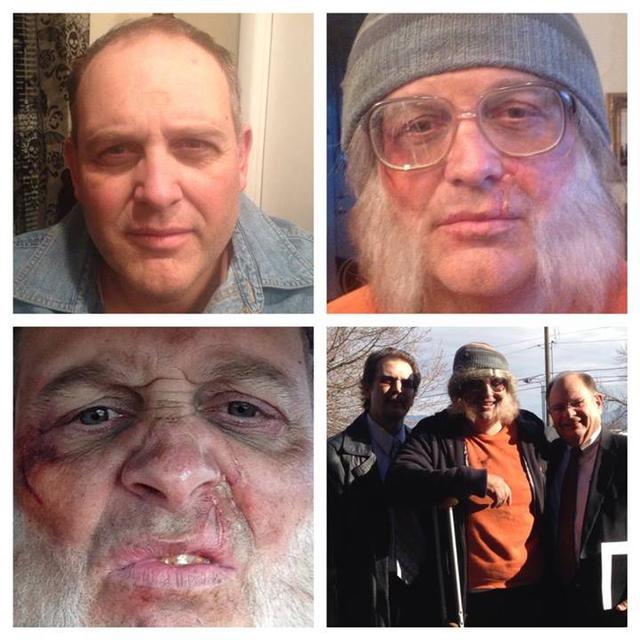 David Musselman, a bishop for The Church of Jesus Christ of Latter-day Saints, did not receive his usual greetings as he approached his meetinghouse last Sunday. But then again, Bishop Musselman is usually not disguised as a homeless man for church. From Deseret News
David Musselman, a bishop for The Church of Jesus Christ of Latter-day Saints, did not receive his usual greetings as he approached his meetinghouse last Sunday. But then again, Bishop Musselman is usually not disguised as a homeless man for church. From Deseret News
“As a bishop I try to always be as giving as I can, and I was surprised at my own inability to have compassion,” Bishop Musselman said in an interview with the Deseret News. “I thought about some ways I could somehow convey the importance of not being critical … and sometimes the best way to do that is through experiences that go beyond just a talk in church. And so I just laid awake many nights just thinking about what I could do, and then this kinda popped into my brain.”
To make his altered appearance more convincing, Bishop Musselman contacted Salt Lake City makeup artist Tara Starling to transform his familiar face in the Taylorsville, Utah, congregation to that of a virtual stranger.
“The plight of the homeless is something that is particularly close to my heart,” said Starling, who co-created a nonprofit organization called Soul Food USA that provides both food and encouragement to the homeless. “So when Dave (Musselman) approached me with this idea, it was this magical moment of the two parts of my life, my two worlds, colliding in the most perfect way.”
Bishop Musselman received varied reactions to his appearance in the church building. At least five people asked him to leave the property, some gave him money and most were indifferent to his presence.
“Many actually went out of their way to purposefully ignore me, and they wouldn’t even make eye contact. I’d approach them and say, ‘Happy Thanksgiving,’ many of them I wouldn’t ask for any food or any kind of money, and their inability to even acknowledge me being there was very surprising,” Bishop Musselman said. “It made me think of the category of people that … the Savior has the most difficult time with. That’s the people that are lukewarm. That really don’t take a stand either way.”
Most of the children in the congregation were curious and wanted to give to the “homeless man” the bishop appeared to be.
“They (the children) looked to their parents to determine whether or not that was safe, and that’s certainly something you would expect and it’s a good thing,” Bishop Musselman said. “Some parents completely embraced it with their children, other parents were very, very guarded and evasive.”
But even with some negative reception, Bishop Musselman said he learned not to judge people’s motives and hearts.
“One of the gentlemen that approached me and asked me to leave the property felt horrible (afterward), and it would be easy to judge him,” Bishop Musselman said. “But what I didn’t know about this was that just one year before that time his granddaughter had come to his church … and helped an old man get into his car, and at the time that she did that, he was faking, and he stole her purse and drove off. So he came out because he was concerned about the safety of people, and his experience caused him to view me through a different lens.”
Bishop Musselman told only his second counselor that he would be disguised as a homeless man. The bishop purposefully walked to the front of the chapel and sat in the front row at the beginning of sacrament meeting. After his counselor’s talk, the bishop had his counselor lean forward over the stand and he asked through a whisper if he could say a few words.
Although he received a few wary looks, Bishop Musselman walked onto the stand stood behind the pulpit and began thanking people for the kindness they showed. He talked about some money he received, and said he wanted to give a portion of it back as a token of his appreciation. He asked where the bishop was so that he could give the money to him. When no one spoke, Bishop Musselman took off his wig and glasses to show that he was, in fact, the ward’s bishop.
“It had a shock value that I did not anticipate,” Bishop Musselman said. “I really did not have any idea that the members of my ward would gasp as big as they did.”
After the services, Bishop Musselman texted Starling to let her know how the disguise played out. Later that day, Starling shared the experience as well as pictures documenting Bishop Musselman’s transformation on Facebook.
“Social media is such a powerful tool for spreading ideas,” Starling said. “People are sharing that it has really touched them, and it has caused them to think again and look at things in a different way and maybe change their mind about the way that they treat people and to endeavor to look beyond the face, into the heart.”
The comments and private messages Starling has received on her post about Bishop Musselman’s experience have proved to be meaningful to her as well.
“I used to dream … (that) the pinnacle of my career would be to work on a film and the film would get nominated for an Academy Award of makeup. You know, that would just be the ultimate achievement,” Starling said. “But I would have to say that somebody writing a Facebook comment … saying, ‘Thank you for sharing this. It’s changed my mind. It’s changed my heart, and it’s changed the way that I’m living,’ that’s worth more than all of the Academy Awards in the world to me. It really is.”
Bishop Musselman’s takeaway from his experience is not one about human faults; rather, it is of people’s desire to improve.
“I learned that more people want to be better than I had originally thought,” Bishop Musselman said. “I learned that we don’t know what happened to an individual, and so we can’t and never should try to judge.”
Abby Stevens is a writer for the DeseretNews.com Faith and Family sections. She is a graduate of Brigham Young University–Idaho. Email: astevens@deseretdigital.com

